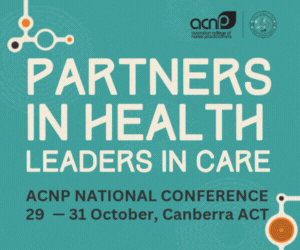Mentoring has proven to be a successful way of facilitating the professional growth and development of recently graduated nurses and other nurses transitioning to a new role.
So what makes a good mentor?
A willingness to give your time, an ability to connect with the person and to recognise your own limitations, says Professor Marion Mitchell of the School of Nursing and Midwifery at Griffith University.
Here are 10 key tips to effective mentorship.
Commitment
Mentoring is an ongoing active process. A mentor needs to be willing to invest time and energy in a one-on-one relationship.
If you commit to it, you commit to it, says Professor Mitchell.
“It’s really important if you say you’re going to do it, then do it. It’s unfair to commit and then say you’re too busy. It’s often not in our job description, we do it in order for our junior colleagues to learn to fly.”
Mentorship is a contribution to advancing the future of nursing, says Professor Mitchell.
“If we really want to retain our good nurses we need to be giving back to our profession and supporting those through mentorship, whether it’s a new grad or someone in the middle of their career or taking on a new role such as research.
“It’s a privilege to be a mentor; to see someone new get a grasp of their new role and absolutely grow and become successful. You see the advancement in their career and their personal achievement.”
Supportive
A mentor’s role is to support and encourage individuals to manage their own learning in order to develop their skills.
Mentors need to be personable, approachable, reasonable, and competent individuals committed to helping mentees achieve the success of which they are capable. A good mentor not only strengthens the mentee but the person as well.
“I think you need to be a good listener,” says Professor Mitchell. “It’s not for us to be espousing advice. It’s about helping mentees work out a solution, learning to problem solve.”
Role Model
The mentor is the guide, expert and role model who helps develop a new or less experienced mentee.
“As mentors we use our experience and insights that have helped us to help them,” says Professor Mitchell.
The mentor serves as an experienced guide and provides the mentee with direction and insight to assist the mentee in achieving his or her own goals.
“I always want to know ‘Where do you want to be in five years?’” says Professor Mitchell of a mentee.
“It helps them work out what they want or need from a mentor. It helps me to know what I need to do to help them get there. What do they want from me to help them achieve their needs?”
Realistic expectations
Mentoring is a reciprocal and collaborative learning relationship between two individuals with mutual goals and shared accountability for the success of the relationship.
It is vital that the mentor and mentee communicate realistic expectations and goals, says Professor Mitchell.
“Are their expectations realistic? Do they want to meet every week? Do not assume you know.
“You might have to say, ‘I may not be the best person to help you but I can find someone else who is, in order for you to achieve that’. Never let someone feel like they are being a nuisance. If they’re expectations are unrealistic, say so.”
Patience, honesty and collaboration will help foster stronger relationships.
The right fit
Mentoring is an ongoing relationship between a mentor and mentee for as long as both find meaning and value in it.
It’s important you click with the person, says Professor Mitchell.
“If you do not think you are going to click don’t pursue it. Go with your gut feeling. A mentor or mentee should never be offended if either thinks it won’t work out. It needs to be effective, not an extra task to do. If it’s not working and you’ve tried to remediate the situation, let it go. Cut your losses sooner rather than later.”
Appropriate mentor
In the role of a mentor, it’s important to remember what it was like to be new to a position or task.
Professor Mitchell suggests having a mentor who knows your role.
“If you’re a new grad, perhaps a CN or someone the next level up, they understand what it’s like to be in your position as they were there not so long ago. They can help you by sharing their personal pitfalls and experiences.”
Successful mentoring relationships are built on trust, openness to disclosure, affirmation and willingness and skill in giving and receiving feedback.
Positivity
Ideally, a mentor should be someone who is passionate about their practice and passionate about sharing knowledge.
“You need someone that is positive,” says Professor Mitchell. “You don’t want someone saying ‘Oh, you won’t ever be able to do that’. You need someone with enthusiasm and the right motivation for being a mentor.”
That motivation has to be intrinsic not extrinsic, says Professor Mitchell.
“You need to have a genuine interest in your junior colleagues and not expect anything in return for it, such as a pay rise or promotion. You need to want to do it and see the value in it.”
Know your own limitations
It’s important to be willing to learn yourself, says Professor Mitchell.
“Acknowledge your own limitations. You don’t have to be the font of all knowledge. Seek outside help and learning. I don’t know this procedure, let’s find someone that does. It’s role modelling and being careful about your scope of practice.”
Formal mentorship program
Formal training programs provide a foundation and the experience to prepare for leadership roles and evidence based practice.
“I think it’s important to formalise it,” says Professor Mitchell. “A formal mentorship program works. I think it’s because it’s over a period of time where you can really see outcomes and achievements which are less easily identified in the informal support networks we have in the clinical area.”
Reflection
Not all mentor-mentee relationships are successful. Sometimes the interpersonal dynamics or the match doesn’t work. Problems may occur if the mentor or mentee are unable to maintain the commitment or lose communication.
“Sometime it’s a fizzer, it doesn’t work out. Glean what happened and learn from it,” says Professor Mitchell.
Success breeds success, she says.
“The mentor and mentee relationship where it works well, often goes from strength to strength and leads to some great outcomes.
Successful mentors nurture mentees, who eventually develop into leaders and become mentors themselves.”








